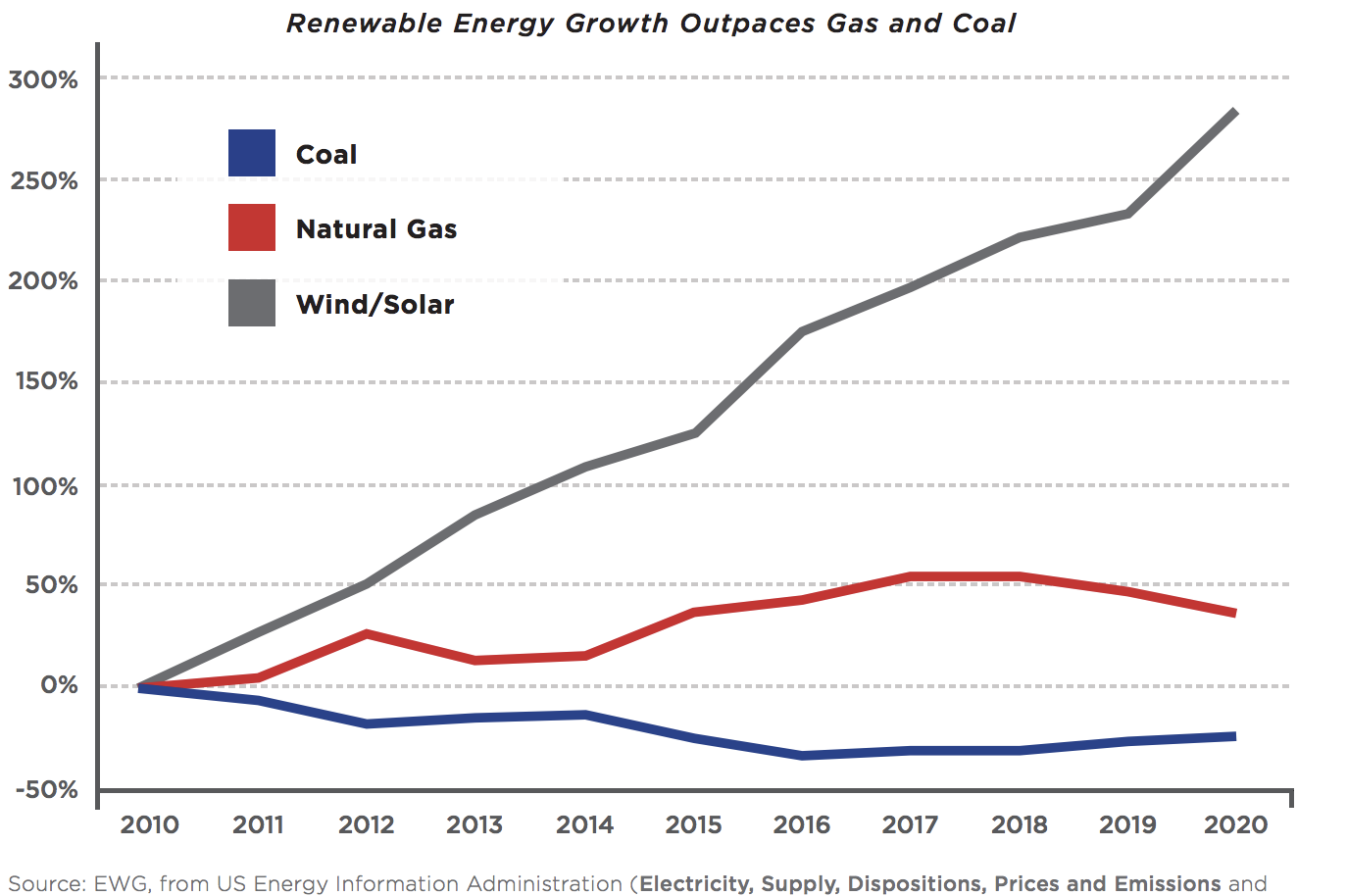Energy Secretary Rick Perry recently ordered the Federal Energy Regulatory Commission to fast-track a rule that purports to make the energy grid more resilient but which in reality will force utility customers to buy more expensive electricity from coal and nuclear plants. A new report by the nonprofit Environmental Working Group (EWG) casts this proposal as a thinly veiled bailout for two industries that are no longer competitive in the electricity generation markets.
According to federal data compiled by EWG, without this bailout, utilities plan to close 75 coal and nuclear plants in the next three years.
“The administration’s attempt to prop up its friends in the coal and nuclear industries isn’t just picking winners and losers, but picking energy sources that are already proven losers,” said Grant Smith, EWG‘s senior energy policy advisor. “It’s like trying to bring back the market for whale oil. Perry’s absurd proposal could keep these dying industries on life support a bit longer, but the competition for America’s energy future is over, and renewables have won.”
The energy and environmental policy firm Energy Innovation estimates this proposal would come at a monumental cost for ratepayers: up to $10.6 billion a year.
Most of that money — as much as 90 percent — would be concentrated on reviving 10 companies, if that. One of them, the Ohio utility FirstEnergy, has the potential to receive $500 million each year from the Department of Energy proposal. Meanwhile, the company is attempting to stay solvent with the possible sale of more than a dozen of its declining nuclear and coal facilities.
This summer, the Associated Press revealed that coal baron and CEO of Murray Energy, Bob Murray, had sent a letter to a Trump aide in a plea to keep FirstEnergy, a major customer of his company, from descending into bankruptcy. Murray, who recently gained notoriety when profiled on Last Week Tonight with John Oliver, communicated in the letter that “we are desperate for the President to, once again, order Energy Secretary Perry to … declar[e] an emergency on the electric power grid.”
Murray also wrote that he couldn’t figure out why this had not yet been accomplished, saying, “In Youngstown, Ohio, nine days ago, after my personally speaking with President Trump, he turned to Energy Secretary Rick Perry and said three (3) times, ‘I want this done.’”
That letter was sent in August. While Perry did not invoke the Federal Power Act to declare an emergency, by September, he had called on the Federal Energy Regulatory Commission (FERC) to “require regional electricity suppliers to buy above-market-rate power from coal and nuclear plants, even when cheaper sources are available,” according to EWG. The result would be massive bailouts for failing business models in the coal and nuclear industries.
This proposal is such a blatant handout to the coal and nuclear industry that even former FERC chairman Norman Bay has criticized it. He noted: “[T]he economic forces are simply too strong. Prices continue to decline for wind, and solar, and other forms of technology — including energy storage — and I don’t think you can fight that. At the end of the day, I think all you can try to do is slow it down.”
The Trump administration’s approach seems bent on this delay approach, to the tune of handing out over 10 billion dollars of taxpayer money to private corporations every year.
The Markets Have Spoken: Solar, Wind Are Winners
The Trump administration’s proposed bailout of the coal and nuclear industries is part of a larger effort to support industries struggling to stay relevant in current energy markets. In addition to Trump’s promise to withdraw from the Paris climate agreement, the U.S. will actually be promoting fossil fuels and nuclear energy as so-called climate solutions at the United Nations climate summit (known as COP23) in Bonn this month.
“Trump’s decision to pull out of the Paris climate accord has made the U.S. an energy pariah to the rest of the world,” said EWG President Ken Cook. “Perry’s scheme is more madness that would not only further set back global efforts to curb carbon emissions, but force Americans to pay billions for dirtier air.”
But as Bay and many others have pointed out, solar, wind, and natural gas are cheaper sources of electricity than coal and nuclear, with solar and wind already becoming cost competitive with, if not even more affordable than, natural gas and other fossil fuels.
Yet another new analysis, released at the COP23 climate summit this week, illustrates how propping up these failing fossil fuel industries is throwing good money after bad ideas. The study, produced by Finland’s Lappeenranta University of Technology and the Energy Watch Group, concludes that all electricity generation could be produced with renewable energy by 2050 and would cost less than current prices, according to Climate News Network.
“A full decarbonization of the electricity system by 2050 is possible for lower system cost than today, based on available technology. Energy transition is no longer a question of technical feasibility or economic viability, but of political will,” said Christian Breyer, the study’s lead author.
Of course, the political will in America currently appears intent on supporting the fossil fuel and nuclear industries while attempting to slow the growth of renewable energy, as the rest of the world moves forward with clean energy and climate solutions.
“There is no reason to invest one more dollar in fossil fuel or nuclear power production,” said Energy Watch Group president Hans-Josef Fell. “Renewable energy provides cost-effective power supply.”
Main image: Coal Credit: Kentucky Photo File, CC BY–NC–ND 2.0
Subscribe to our newsletter
Stay up to date with DeSmog news and alerts







